- Joined
- Dec 12, 2016
- Messages
- 35,402
- Reaction score
- 14,720
- Gender
- Male
- Political Leaning
- Liberal
I think one can distinguish between Reagan, who condemned Medicare when it was being considered, but did little (I know of) to harm it when in office, the Reagan who slowed civil rights enforcement which was his prerogative as Prez, and Gingrich who was a disrupter, one who didn’t want government to function.I think, my friend, you're going to have to do better than that. In what way are they "not doing their jobs"? I don't think, frankly, your assertions are responsive.
I stand by my statement, "It is often the mission of conservatives to prevent government from functioning". Prove me wrong. I have lots of evidence I can muster, and I'm not talking about the fringe pseudo-conservatives Brooks objects to. We can go back a century for examples.
I don’t think conservatives generally want to prevent government from functioning, tho one could argue that states’ resistance to the changes suggested by the ACA - depriving their citizens of fairly low cost benefits - reflects that.



:max_bytes(150000):strip_icc()/Ronald-Reagan-5c6e3e6c46e0fb0001ce2a04.jpg)